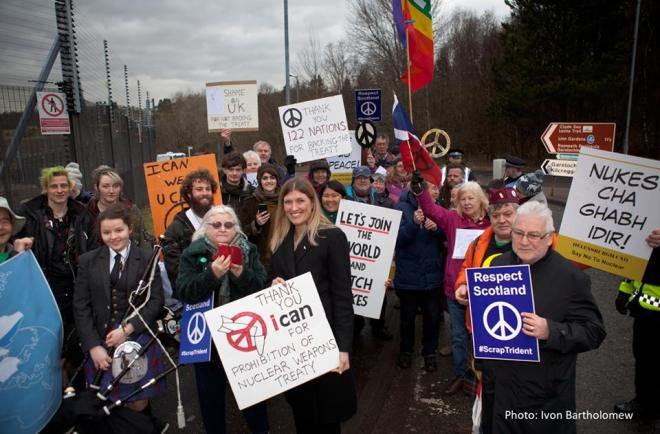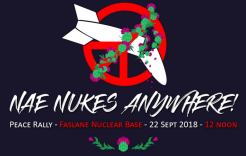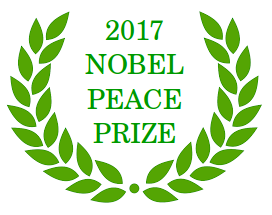House of Lords
INTERNATIONAL RELATIONS COMMITTEE CALL FOR EVIDENCE: THE NUCLEAR NON-PROLIFERATION TREATY AND NUCLEAR DISARMAMENT
Scottish CND have submitted the following responses to the questions posed
1. What is your valuation of the current level of risk?
A Chatham House 2016 report offered to the Open Ended Working Group of the UN on prohibition and elimination of nuclear weapons concludes that nuclear weapons pose overwhelming dangers to global health, development, climate, social structures and human rights and suggests that human security and survival of the species is under threat from them.
The Atomic Scientists Bulletin have set the Doomsday clock rating for 2018, at two minutes to midnight (the highest level of risk since 1953), and agrees with Chatham House that accelerating climate change and the continued existence of nuclear weapons present an inextricably linked existential risk to life on earth. The possibility that nuclear weapons might be used through accident or deliberately is increased through reckless rhetoric, increased numbers of non governmental actors active in conflicts, especially where governments are fragile, and increasing technological developments that make nuclear weapons more visible and vulnerable to attack.
2. Ahead of the 2020 Review Conference of the Nuclear Non-Proliferation Treaty (NPT), what are the biggest challenges facing global nuclear diplomacy?
Despite the adoption at the UN of a new treaty to provide a robust legal instrument specifying prohibition of nuclear weapons to complement the exiting nuclear diplomatic regime (The TPNW), lack of political will and inaction from governments who persist in reckless empire building and refusing to work together or address evidence-based assessments regarding climate and other global challenges present a huge challenge to progressing nuclear diplomacy. Governments must respond to the scientists and NGOs which can provide expertise and evidence. It must work with them to create legislation and co-operation to deliver the elimination of all WMD. Scottish CND supports an international approach to encouraging member states to sign and ratify the TPNW in order that it can enter into force as soon as possible, prohibiting nuclear weapons and leading to their elimination.
a. To what extent do states still view the NPT as relevant?
Nuclear-armed states that are signatories to the treaty are increasingly attached to security doctrines that they see as allowing them to maintain nuclear weapons and to forestall their obligations to disarmament under Article 6. Some consider that nuclear disarmament does not address today’s security problems, and advocate delaying disarmament until the risk is diminished, rather than recognising the urgency of disarmament in addressing the increased risk. Many other states, inside and outside of the NPT, see the TPNW as a critical component in facilitating the NPT in achieving its purpose. Scottish CND considers that, in becoming a party to the TPNW, the UK Government could fulfil its NPT obligations.
b. What are the prospects for other components of the nuclear non-proliferation regime, such as the Comprehensive Nuclear-Test-Ban-Treaty (CTBT)?
Like the NPT, The CTBT has provided a useful step in stigmatising nuclear weapons and nuclear testing. Despite the CTBT not entering into force,(critical nuclear-armed states are not committed to it) it has had an effect in slowing down the arms race and altering the perspective that nuclear weapons use has legitimacy. Important lessons can be learned, and continued negotiation can highlight sticking points, and the progress made in overcoming them. But without the absolute prohibition which the TPNW could provide, important ground gained can be lost when member states limit or even withdraw their support from existing agreements (for example the INF). Scottish CND acknowledges the importance of these other components and strongly advocates that the UK Government takes a positive approach to preparing for the TPNW’s entry into force, especially because it has already an important place in the rule-based international regime and it has already had a significant impact on diminishing financial investment in nuclear weapons. Scottish CND hopes that the UK Government will engage in meaningful discussion of how the TPNW can impact on UK foreign policy in the next few years. At the very least, the Government should agree to attend future meetings of TPNW state parties as observers, and ensure that it provides such useful technical assistance in areas where it can such as verification. It should also consider contributions it may make to remediation in countries where the UK has tested nuclear weapons. The UK Government should maintain and increase dialogue with UN member states which are committed to the TPNW
c. How important are these agreements to the wider rules-based international order?
These agreements are at the heart of the accountability of governments, not only to the people that elected them or on whose behalf they govern, but in their shared responsibility beyond borders, to preserve and explore the acceptable boundaries of human behaviour without recourse to violence and the use of force. Scottish CND requests that the UK Government avoids misconceptions by participating and contributing to the processes and opportunities that the UN regime offers and ensuring that these are communicated clearly to the public.
d. To what extent does the existence of three nuclear armed states outside the NPT (India, Israel and Pakistan) destabilise the overall regime?
The overall regime has failed to achieve non-proliferation as far as these states are concerned because the nuclear-armed states have failed to deliver nuclear disarmament, leaving their argument that they need the weapons for their own security open to adoption by other states. If the existing NPT state parties were to take a position that the present state of global insecurity requires them to maintain and modernise their nuclear weapons at the 2020 Review conference it would seem very likely that other states would follow the example of India etc. Hopefully the existence of the TPNW may stop that from happening. The continued existence of nuclear weapons in politically volatile regions like the Middle East and North Africa (MENA) region and the northern Indian subcontinent increases the likelihood of accident or use by governments or non state actors.
e. What prospects are there for a Middle East WMD free zone?
The best prospect for a Middle East WMD free zone lies in allowing and supporting negotiations between interested parties without external interference or military support. Scottish CND hopes for consideration to be given to the impact of UK investment in the arms trade in the region.
The United States
3. To what extent will the United States’ withdrawal from the Iran nuclear deal, as well as US efforts to achieve the denuclearise of the Korean Peninsula, affect the wider nuclear non-proliferation regime?
Scottish CND regrets the US withdrawal from the Iran deal and considers that the UK Government should distance itself from US nuclear posture in the MENA and across the South Pacific region at the present time and instead offer facilitation to actors in the regions to participate in negotiations without self-interested influence from states outside the region.
Nuclear arms control
4. To what extent and why are existing nuclear arms control agreements being challenged, particularly the Intermediate-Range Nuclear Forces Treaty (INF) and the New Strategic Arms Reduction Treaty (New START), and what prospect is there for further such agreements? What prospects are there of progress in negotiating a Fissile Material Cut-Off Treaty (FMCT)?
Challenging of these treaties puts us all at grave risk. Unfortunately, it is a risk that will persist as long as nuclear weapons exist in the world. Scottish CND would like to see the UK Government to take immediate and urgent steps to bring about dialogue and negotiation between treaty state parties, to make the best diplomatic efforts that it can to preserve these treaties while recognising their limited scope, and so to recognise the need to engage with the TPNW and the governments in the world that are working for complete prohibition of all nuclear weapons leading to their complete elimination.
5. What effect will nuclear renewal programmes have on the nuclear non-proliferation and disarmament regime? To what extent could technological developments—including in missile capabilities, warhead strength, and verification—undermine existing non-proliferation and arms control agreements?
Modernisation of nuclear arsenals carries a cost to other government programmes, involves automated systems that carry an inherent risk through lack of possibility for human intervention at an early stage in failure, and heralds the start of a new arms race. Planning upgrades rather than elimination might be seen as unwillingness to consider disarmament at all, a view that is reinforced when nuclear-armed states have governments that project a volatile and unpredictable political world order.
New technologies
6. To what extent will technological developments, both directly relating to nuclear weapons and in the wider defence and security sphere, affect nuclear diplomacy?
New technologies and detection capability mean that the policies of neither confirming or denying the presence of nuclear weapons, along with maintaining their invisibility and the invisibilities of (for example) submarines carrying them can no longer be relied upon. The unpredictable rate of climate change and some of its effects, mean the possibility of nuclear activity triggering uncontrollable global impact cannot be accurately predicted. It will become increasingly difficult for trust to be maintained amongst so many unknown elements that diplomacy will be compromised.
The development of drones, and cyber warfare methods and activity by non state actors mean that the use of nuclear weapons without state sanction is increased. There is no ‘safe pair of hands’.
The Treaty on the Prohibition of Nuclear Weapons
7. If it were to enter into force, how would the Treaty on the Prohibition of Nuclear Weapons (commonly referred to as the Ban Treaty) affect efforts to prevent the proliferation of nuclear weapons and bring about disarmament?
The history of efforts towards elimination of weapons shows that prohibition has a huge impact on indiscriminate weapons losing their political and reputational status and being seen as shameful and unacceptable. This will make their acquisition, and therefore proliferation, a very unattractive proposition. This process has already started with the TPNW, with over 50 major international financial institutions already divested from nuclear weapons since the TPNW was adopted. The negotiations for the TPNW also flagged up the democratic deficit in nuclear weapons policies globally, and the treaty’s highlighting the disproportionate impact on women and girls will increasingly inform decision makers across the world when the treaty comes into force. State parties will reconsider their alliances, and when threatening to use nuclear weapons is widely regarded as a breach of International Humanitarian Law, it will be difficult to reference nuclear deterrence as a legitimate form of defence
The P5
8. What are the policies of other P5 countries (China, France, Russia and the United States), and the UK’s other partners, on the Non-Proliferation Treaty (NPT) and on nuclear weapons more generally? Have these policies changed, and if so, why? How effective has the P5 process been, and what role will it have in the future?
Member states in the P5 hold differing positions on aspects of nuclear diplomatic ideology, for example different stances on negative security assurances. It is difficult to gain a real understanding of what these differences mean or what they offer without a far greater degree of transparency and discussion than is presently allowed. The consensus rules of negotiation have shut down questioning around these differences and blocked any exploration of new initiatives. Blocks have even prevented any clear outcome record following meetings of the state parties.
The role of the UK
9. How effective a role has the UK played in global nuclear diplomacy in recent years? How could the UK more effectively engage on nuclear non-proliferation and disarmament? What should the UK Government’s priorities be ahead of the 2020 NPT Review Conference?
The UK Government’s backing of the US threats to withdraw from the INF – and UK participation in the US-led inappropriate and undignified behaviour outside a UN conference (to which all of the P5 states had been invited) reduces UK credibility on the global stage as a state with a commitment to nuclear disarmament, as resolved in the UN General Assembly’s first resolution. It has partly redeemed itself in supporting the EU’s blocking statute on US withdrawal from the JOCPT. Scottish CND would welcome the UK Government making an unambiguous commitment to the NPT, including Article 6 regardless of any US position. We would also like to see the UK recognise the TPNW and work in preparation for its impact and its possible entry into force around the start of the NPT Review Conference in 2020. At this year’s final Preparatory Committee meeting in advance of the NPT Review Conference, we would like to see the UK ensure representation at Ministerial level.
From a Scottish perspective, the UK has misrepresented and disregarded the real concerns, questions and interests of not only the citizens of this country, but its elected representatives at Westminster, as well as the Government of Scotland and Members of the Scottish Parliament, while continuing to site and even planning to renew the UK nuclear weapons in Scotland. At the very least, The UK Government should include representation on a delegation to the NPT Prep con in May by at least one Scottish member of Parliament from Scotland’s majority party at Westminster plus a representative, elected or official, from the Scottish Government, to be selected by Scotland’s First Minister.
This submission was prepared on behalf of Scottish CND by Janet Fenton. Any questions may be addressed to janet@wordsandactions
Like this:
Like Loading...
 While extinction rebellion was bringing the climate crisis to the world’s attention via non- violent direct action, a group of just twenty folk from Scottish society – academia, Scottish Parliament, community and single issue organisers – were putting their heads together to think about what real lasting security could mean in Scotland. This was a three day informal seminar, called Secure Scotland which took place at the Allanton Peace Sanctuary near Dumfries, and while some of us would otherwise have been protesting with XR , the same need to galvanise for urgent change was the real driver for this event.
While extinction rebellion was bringing the climate crisis to the world’s attention via non- violent direct action, a group of just twenty folk from Scottish society – academia, Scottish Parliament, community and single issue organisers – were putting their heads together to think about what real lasting security could mean in Scotland. This was a three day informal seminar, called Secure Scotland which took place at the Allanton Peace Sanctuary near Dumfries, and while some of us would otherwise have been protesting with XR , the same need to galvanise for urgent change was the real driver for this event.



 in addition to the Scottish CND demonstration on the 22 September at Faslane, a programme of meetings has been put together by the wider peace movement in Scotland to ensure that when our international visitors are here, we can all have real and useful dialogue to empower our shared effort to use the TPNW to end nuclear terrorism Download the programme
in addition to the Scottish CND demonstration on the 22 September at Faslane, a programme of meetings has been put together by the wider peace movement in Scotland to ensure that when our international visitors are here, we can all have real and useful dialogue to empower our shared effort to use the TPNW to end nuclear terrorism Download the programme

 Peace Rally will take place at Faslane on the 22nd September 2018 and we will welcome campaigners from all of the nuclear armed states as well as from non nuclear countries, and of course we are expecting to see campaigners from every part of the UK converging on the site to make the message clear that its time for the UK to wake up and wise up.
Peace Rally will take place at Faslane on the 22nd September 2018 and we will welcome campaigners from all of the nuclear armed states as well as from non nuclear countries, and of course we are expecting to see campaigners from every part of the UK converging on the site to make the message clear that its time for the UK to wake up and wise up.


You must be logged in to post a comment.